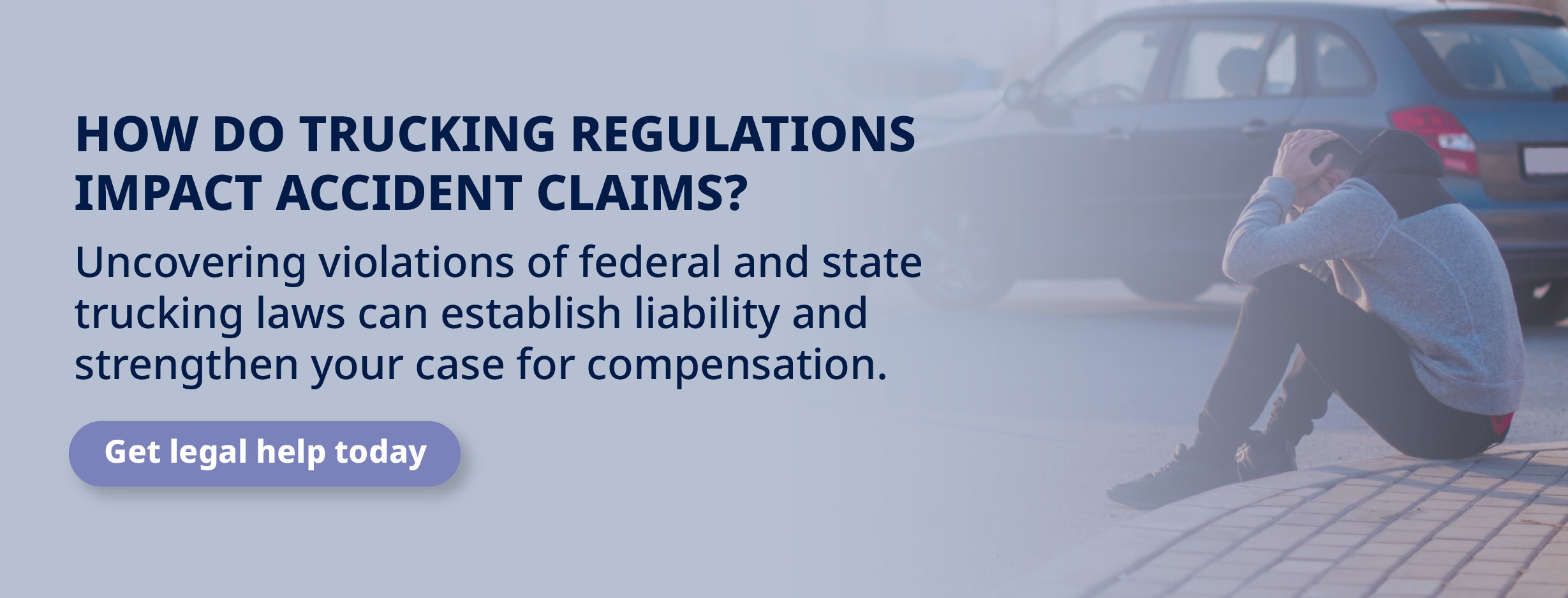You may be driving a familiar route through St. George, a city known for its striking desert landscapes, when you suddenly see a massive commercial truck barreling toward you. The next thing you know, you are dealing with painful injuries, ambulance rides, and the overwhelming pressure of mounting hospital bills.
You might feel worried about the extent of your injuries and how they might affect your ability to work or enjoy life. Meanwhile, you might also worry that insurance negotiators will try to deny your claim or settle for such a small amount that it barely scratches the surface of your medical expenses.
These concerns can plague your mind, intensifying your stress during a difficult period. However, there is hope. Truck accident victims in St. George, and throughout Utah, have legal rights to seek compensation for their injuries, especially if driver negligence or poor vehicle maintenance contributed.
Flickinger Boulton Robson Weeks, with a track record of multi-million dollar outcomes in personal injury cases, is here to outline the most frequent injuries, how to handle the long-term impacts, and what you can do to build a robust claim. By understanding your situation clearly, you give yourself the best opportunity for a secure financial recovery.
Truck accidents often cause more serious harm than typical car collisions, given the large size and weight of commercial vehicles. Some injuries frequently associated with these crashes include:
A hard jolt or direct strike to the head may lead to brain damage. TBIs vary from mild concussions to severe injuries causing long-term symptoms, like memory loss, difficulty concentrating, or mood swings.
Such trauma can severely limit your day-to-day life, requiring continuous therapy or assisted care. Following a collision with a truck, repeated headaches or confusion might point to undiagnosed brain harm.
The spine’s role in transmitting signals to and from the brain means a spinal injury can profoundly alter movement or sensation. A forceful crash might fracture vertebrae, compress the cord, or sever it. Outcomes include paraplegia, quadriplegia, or partial numbness. These injuries can bring steep medical bills for surgeries, rehab, and potential home remodeling if you need a wheelchair. Emotional adaptation is equally demanding, as everyday tasks suddenly become challenging.
In severe collisions, drivers or passengers can find their limbs pinned or crushed by truck wreckage. Sometimes surgeons must amputate a leg or arm to save the victim’s life. Besides dealing with an artificial limb, emotional trauma can follow, impacting self-image and ability to resume usual job duties. Acquiring quality prosthetics or long-term therapy can be expensive, intensifying the need for appropriate compensation.
Having an experienced, knowledgeable lawyer from our team by your side can ensure no part of your suffering is overlooked.
Bones in the arms, legs, or ribs commonly fracture under the heavy force of a truck crash. Internal organs like the liver, spleen, or lungs can sustain critical damage too, leading to possible surgeries or long hospital stays. While these might not be as permanently disabling as spinal cord trauma, they still can leave you out of work and saddled with medical debt.
Not all harm appears in medical imaging. Some victims grapple with PTSD, nightmares, or a lasting fear of riding in vehicles. Car collisions involving large trucks can be exceptionally frightening, leaving emotional marks that hamper normal living. Therapy and counseling might be essential for healing.
When facing such serious harm, immediate care is crucial. An early diagnosis helps connect your injuries directly to the crash, preventing insurers from contending they arose elsewhere. Detailed evidence and medical evaluations also strengthen your claim, ensuring you do not accept a low settlement that fails to match your long-term needs.

Injuries from major truck accidents often require extensive medical treatment. Understanding your care path and documenting each step can support both your health and any claim for damages.
Immediately following a crash, victims might receive urgent care to stabilize injuries. Paramedics transport you to the nearest hospital, where doctors run imaging tests to diagnose fractures or internal trauma. In severe cases like head injuries or complex breaks, emergency surgery may happen right away to prevent complications.
Extensive injuries often result in multi-day or multi-week stays in a hospital’s trauma unit. Surgeries might fix spinal fractures or implant rods to align broken bones. Brain swelling could require specialized monitoring in an intensive care setting.
In the case of amputations, multiple procedures might be needed to handle infections or prepare the residual limb for a prosthesis. These hospital fees accumulate quickly, so collecting every billing statement is important if you plan to file a claim.
Post-hospital care might include physical therapy sessions or a rehab facility to restore mobility and strength. If your arms or legs are in casts, muscles can weaken from inactivity. Therapy tasks could include learning how to walk with an assistive device or practice balancing after an amputation.
Progress can be slow, and missing therapy sessions might hamper your long-term improvement. Keeping up with appointments shows insurers you are serious about full recovery, reducing arguments that you neglected your health.
Major collisions induce stress, anxiety, or depression. Counseling, group therapy, or medication may help individuals process trauma and adapt to any new physical limitations. Some find it challenging to drive again or even be near large trucks, so seeking professional guidance can be integral to your overall well-being.
Consistent check-ups with your surgeon or a specialist track your improvement. They might recommend additional treatments if complications arise. These visits help confirm that your injuries remain linked to the crash and not to another event. If you experience persistent pain or partial disability, doctors’ notes and tests illustrate why ongoing care or job modifications may be necessary.
Keep a file with all of your hospital invoices, therapy receipts, or prescription costs. Summaries from each medical provider detail diagnoses, interventions, and prognoses. A complete record of expenses and your daily struggles with pain or limited mobility can prove invaluable during insurance negotiations or at trial.
This focus on healthcare is twofold: it optimizes your healing and also cements your claim for reimbursement. By taking advantage of recommended treatments, you guard against insurers alleging you worsened your injuries through neglect.
Thorough, well-structured medical records not only reveal the seriousness of your condition but also support a fair financial settlement or court award that aligns with your future needs.
Major truck accidents often cause injuries that are not simply “fixed” with one procedure. Instead, survivors might deal with prolonged physical, emotional, and financial implications:

What appears as a fractured bone might heal but continue to ache for years, especially in the back or neck region. Some individuals develop limited joint motion if their injuries required metal implants or if muscles were severely torn. Even everyday tasks like climbing stairs or carrying groceries can become a daily reminder of the collision.
In catastrophic cases such as severe brain or spinal cord trauma, returning to previous employment or activities may be impossible. The survivor may need a wheelchair, part-time caretaker, or specialized home modifications like ramps or railings. This level of adaptation is not always covered by basic insurance if a final settlement is too small or poorly negotiated.
Accident-related anxiety or PTSD might linger. Flashbacks or panic attacks can surface whenever near a large truck. If survivors feel self-conscious due to scarring or amputation, that can alter their social interactions. Therapy or counseling sessions might be necessary to manage these emotional wounds, adding more expense on top of existing medical bills.
A spouse might need to become a caregiver, possibly cutting back on their own job. Siblings or children may adjust to new routines in the home. Finances can be strained if the injured person had been the primary earner. Large medical debts and smaller paychecks can lead to stress across the household, requiring skilled legal help to recover enough to cover these ripple effects.
Some find they must leave physically demanding positions. Others lose the ability to drive or enjoy hobbies that once defined their self-image, such as playing sports or traveling. Grieving the loss of your old life can add to your mental burden. Prosthetics or updated vehicles with special controls may restore partial independence, but at a cost often beyond an average budget.
A successful initial surgery does not always mean you are “done.” For instance, hardware used to stabilize the spine or limb fractures can eventually wear out, requiring additional procedures. Scar tissue might build up, leading to follow-up surgeries. Demonstrating these future prospects to an insurer or jury can secure adequate coverage now instead of scrambling for solutions later.
Facing these enduring effects means your settlement or verdict should go beyond immediate medical bills. It must account for therapies, lost future earnings, mental health treatments, and essential adaptive equipment. Capturing these aspects in your claim requires long-term planning and thorough documentation of all impairments, ensuring you do not end up undercompensated years down the line.

Our team of St. George Truck Accident Lawyers at Flickinger Boulton Robson Weeks understands that serious truck accident injuries do not end with the initial hospital discharge. Many victims wrestle with a changing lifestyle, needing months or years of specialized treatments or daily assistance. Our role is to ensure you receive fair compensation that matches not just your present hospital bills, but also future needs. Here are some of the ways we assist:
By combining empathy for your day-to-day struggles with a strategic approach to negotiations or trial, we help you secure the resources necessary for a stable future, even if your injuries demand lengthy care. Our goal is to see you recover, both medically and financially, to the fullest extent possible.
If you have suffered severe truck accident injuries in St. George, do not tackle the legal and insurance obstacles by yourself. Flickinger Boulton Robson Weeks provides caring and experienced representation, focusing on securing enough compensation to cover both your current and future medical challenges, income loss, and suffering.
Call (801) 500-4000 to schedule a free consultation. Our firm has a history of achieving significant results in personal injury cases, and we pledge to dedicate the same effort to your case. Let us advocate for you, easing your burdens so you can concentrate on healing and regaining your life.
Bicycle Accidents
Motorcycle Accidents
Boating Accidents
Recreational Vehicle Accidents
Bus and Mass Transit Accidents
Pedestrian Accidents
Automobile Accidents
ATV or UTV Rollovers
Commercial Vehicle Accidents
Semi Truck and Trailer Accidents
UTAH INJURY LAWYERS
Flickinger • Boulton
• Robson • Weeks
PROVO OFFICE
3000 N University Ave
Suite 300
Provo, UT 84604
SOUTH JORDAN OFFICE
10393 S. Temple Dr.
Suite 103
South Jordan, Utah 84095
OFFICE HOURS
Monday- Friday: 8AM-5PM
Saturday-Sunday: Closed
*Disclaimer: the information provided by this website is for informational purposes only and should not be considered legal advice or a substitute for competent legal counsel.
**SMS consent and contact phone numbers will not be shared or sold to third parties or their affiliates for any purpose.
© 2025 All Rights Reserved.